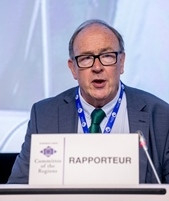
Cllr Gordon Keymer (ECR Group/UK) is the rapporteur for the Committee of the Regions opinion on mobility in geographically and demographically challenged regions. The opinion that was unanimously adopted during the 6-8 October CoR Plenary session calls for a Green Paper on Mobility.
"We need a Green paper on mobility", stated Cllr Keymer. "Mobility challenges are a barrier to sustainable and inclusive growth. Our aim is that mobility issues in challenged regions are better recognised and addressed in the full range of the EU's programmes, increasing access to mobility for all, encouraging new employment opportunities and reducing the risk of depopulation in remote areas."
"Our approach is of course realistic. The real opportunity here is for different EU initiatives to be more scalable and more adaptable to areas of all types, and to complement the focus on urban areas with initiatives which will be of value to other area types" explained Mr Keymer.
The Committee of the Regions used the term ‘challenged regions’ in its opinion. "There has been no adequate definition elsewhere" explained Cllr Keymer. These regions include mountain regions, island regions, sparsely populated regions, border and outermost regions. "However I would not limit our definition. Many regions including rural economies across Europe would recognise both the constraints and the consequences of reduced mobility" stated Cllr Keymer.
The importance of challenged regions is enshrined in the EU Treaties. Articles 174 and 394 of the Treaty on the Functioning of the European Union recognise the restraints faced by geographically and demographically challenged regions and note that "special attention" should be paid to them.
"In this new EU legislative mandate, the European Commission, Council and European Parliament will need to address this important challenge. Until now, the EU’s actions did not always reflect the EU Treaty commitment to grant ‘special attention’ to challenged regions " said Cllr Keymer. "It is time to refresh and rebalance the EU’s transport policy, so that regions of all types and all sizes can benefit".
The Committee of the Regions opinion underlines that tighter public finances, depopulation and rising unemployment are hitting regions hard. Cllr Keymer noted that "every cent the EU spends on transport in the 2014-20 period must truly make it easier for people to move from one location to another."
Remote areas face mobility constraints, which create key challenges. Constraints include increased distances between settlements, and often significant distances to pan-EU corridors and the main transport nodes such highways, airports, and hub railway stations. Also, fewer inhabitants make it difficult to attain a critical mass of potential users to ensure the economic viability of regional airports or other transport systems. Furthermore, specific geographic challenges faced by remote regions which result in extra costs for infrastructure such as providing tunnels in mountain areas.
The challenges that mobility constraints create include a lack of sustainable mobility affecting the attractiveness of rural and remote areas. This applies both in terms of individuals wanting to locate in the area, and the inward investment potential of the local area as assessed by business. There is also a significantly increased risk of social exclusion, as vulnerable social groups suffer from reduced access to employment and other life-enhancing opportunities.
Furthermore, there are territorial cohesion impacts, which are associated with a lack of mobility in a given area. Cllr. Keymer explained that "despite EU Treaty goals to build cohesion in all regions in the EU, we see that urban areas only are prioritised in national and EU policies. A holistic approach to balanced development, one which seeks to spread the benefits of urban growth more equitably, is urgently needed and should form a fundamental pillar of both the EU’s mobility policies and the EU’s regional development policies."

